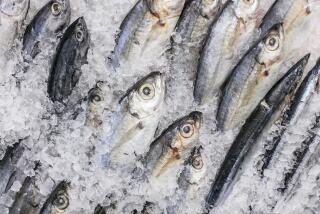EPA Warns Toxins High in Farm Fish
- Share via
HADLEY, Mass. — Atlantic salmon and trout raised in federal hatcheries in the Northeast have high enough levels of dioxin and other pollutants that anglers should eat no more than half a serving a month, federal officials said Thursday.
The U.S. Fish and Wildlife Service commissioned the tests to determine whether the salmon and trout were picking up PCBs and other contaminants from feed.
A study published in January in the journal Science had suggested pollutants found in farm-raised salmon came from PCBs, or polychlorinated biphenyls, in the fish oil and meal fed to the fish.
Each year, the agency’s northeast regional office provides about 14,000 Atlantic salmon, lake trout and rainbow trout that are no longer used for breeding to eastern states for release in their waterways. The big fish are prized by anglers.
The contaminant levels were below both the safety mark set by the Food and Drug Administration for commercial sale, and by the federal Environmental Protection Agency for consumption of fish taken by recreational anglers.
However, tests at five hatcheries showed the levels of PCBs and dioxins in the salmon and both species of trout were high enough for the EPA warning.
“We are recommending that state fish and wildlife directors discuss the test results with their public health officials,” said Marvin Moriarty, regional director.
More to Read
Sign up for Essential California
The most important California stories and recommendations in your inbox every morning.
You may occasionally receive promotional content from the Los Angeles Times.













